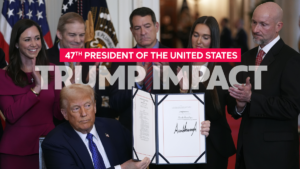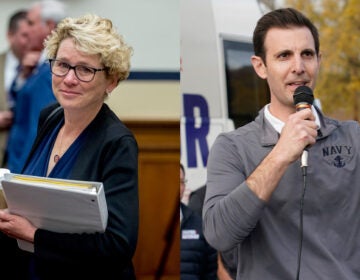U.S. Senate Republicans vote to claw back foreign aid and public media funding
The clawback, if passed by the U.S. House, would eliminate $9 billion in previously allocated foreign aid and federal funding for public broadcasting.
Listen 1:12
Senate Majority Leader John Thune, R-S.D., center, joined at left by Sen. John Barrasso, R-Wyo., the GOP whip. (AP Photo/J. Scott Applewhite)
You are our mission. You’re why WHYY produces fact-based news that’s freely available to all on-air and online. Show your support for WHYY news and programming. Become a member or donate here. You’re WHYY.
The U.S. Senate has passed a bill to claw back $9 billion in previously allocated foreign aid and federal funding for public broadcasting, overcoming resistance from a handful of Republican senators.
Republican U.S. Sens. Susan Collins, R-Maine, and Lisa Murkowski, R-Alaska, broke ranks with their party in voting against the bill, making the vote 51-48.
Roughly $1.1 billion of the funding was previously appropriated for the Corporation for Public Broadcasting, which primarily provides funding to public media, including NPR, PBS and their local affiliates.
U.S. Sen. John Fetterman, D-Pennsylvania, joined Democrats in opposing the effort to defund the CPB. In a statement sent to WHYY News shortly before the vote, he referred to PBS’s Mr. Rogers as “a Pittsburgh icon” who “taught us kindness and empathy.” Fred Rogers developed and filmed “Mister Rogers’ Neighborhood” at WQED, a Pittsburgh public television station, and lived in Pennsylvania for many years.
Fetterman added that his wife, Gisele, an immigrant from Brazil, “learned English watching PBS, where Big Bird and Elmo have educated generations of American kids.”
“As a father, it’s personal, and I can’t understand why we’re even considering taking away this programming for families across the nation,” he added. “These cuts threaten the small, local stations — particularly in rural communities — that rely on federal funding to inform the public on essential news and emergency alerts. Republicans’ decision to eliminate this funding undermines the very values of family and education they claim to champion.”
WHYY News also reached out to U.S. Sen. David McCormick, R-Pennsylvania, who voted for the bill, but he did not respond by the time of publication.
Republicans in Washington have argued the bill is an overdue effort to rein in government spending and accused public media of “leftist propaganda.”
“It’s a no-brainer to slash taxpayer funding of NPR and PBS — disinformation and propaganda outlets that only publish leftist talking points,” U.S. Rep. Scott Perry, R-Dauphin County, previously told WHYY News.
In a pointed floor speech, U.S. Sen. Chris Coons, D-Delaware, focused on the cuts to foreign aid, citing successful efforts to reduce incidence of AIDS and Ebola.
“My colleagues would rather trim one-tenth of 1% of the budget, $9 billion, to cut deeper into food aid and disaster assistance and fighting pandemics all to justify a tax cut,” he said. “I can think of few more despicable acts on this floor in my 15 years.”
Coons had proposed an amendment to restore foreign emergency relief aid.
“I will be trying to get votes to end $465 million dollars of further cuts and disaster assistance that’ll be on the floor today,” he told the chamber. “Taking money from the World Food Program and UNICEF, from Red Cross and Save the Children, from Catholic Relief Services and World Vision.”
The bill now returns to the U.S. House of Representatives for another vote, to discuss the differences from the version the House passed earlier. If Congress passes the bill by Friday, it would represent a rare use of the rescissions process, which allows previously approved spending to be canceled with a simple majority in the Senate. The president is expected to sign it.
Last year, WHYY received just over $3.5 million in direct federal government funding via the CPB that supports its newsroom as well as nationally syndicated shows, such as “Fresh Air” and “The Pulse.” Local TV productions and PBS content, such as the popular children’s show “Albie’s Elevator,” are also partly supported by federal funding.
CPB funding also helps WHYY News provide local and regional coverage for residents of Delaware and southern New Jersey. In addition to its broadcasting operations, WHYY offers after-school media training, media literacy for youth, community engagement events and other local programming, such as “Studio 2.”
The CPB only accounts for roughly 7% of total revenues for WHYY, which serves the nation’s fourth-largest media market. However, many smaller stations, particularly in rural and underserved areas around the commonwealth, rely more heavily on federal funding, so it may be the difference between survival and closure for some.

Show your support for local public media
WHYY is your source for fact-based, in-depth journalism and information. As a nonprofit organization, we rely on financial support from readers like you. Please give today.







